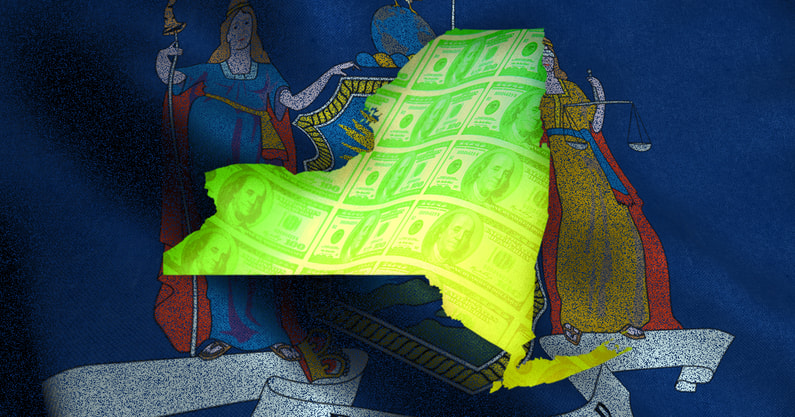New York Gov. Kathy Hochul signs bill overhauling NIL in Empire State

Add New York to the list of states that have signed sweeping NIL reform on the local level aimed directly at bypassing oversight by the NCAA.
According to the New York State Assembly’s website, a bill amending the Empire State’s NIL law has been signed by Gov. Kathy Hochul. The amendment was first passed in both houses in early June. At the time, only Sen. Patrick Gallivan voted against the revision. The new bill became effective immediately after Hochul’s signature.
NIL expert and Newman & Lickstein associate attorney Dan Greene said it “drastically changes the Empire State’s NIL law in a way that greatly benefits schools within the state.” Interestingly, the signing happened less than a week after the NCAA issued an enforcement memo aimed directly at states that took steps to make it easier for local schools to support NIL activities and avoid oversight.
Over the past few months, states across the nation have crafted and passed new laws giving institutions a significant recruiting advantage through NIL. Lawmakers in Arkansas, Colorado, Missouri, Montana, New York and Oklahoma and Texas have sponsored or passed bills to prevent the NCAA from launching investigations into NIL activities.
“New York follows the recent trend of states amending their NIL laws to provide protection from the NCAA,” Greene, who is based in Syracuse, New York, told On3. “But what makes this passage even more noteworthy is the timing of Gov. Hochul’s signing. The NCAA released its guidance memo early last week which expressly targeted bills like this one. However, Gov. Hochul still felt comfortable with signing the bill into law.
“Now, we’ll see how schools in the Empire State, particularly Syracuse University who lobbied for this bill, and their corresponding collectives, react to the passing of this bill while the NCAA’s guidance memo looms.”
Sources have indicated to On3 that Syracuse played a notable role in drafting the legislation.
What’s in the New York law?
Greene said the language of the New York law is almost identical to what recently passed in Oklahoma. The Oklahoma law was chock-full of changes that significantly benefited Oklahoma, Oklahoma State, Tulsa and other local colleges when recruiting and retaining student-athletes who also want to capitalize off NIL. Now it appears to be a similar situation for top New York schools like Syracuse, St. John’s and the state’s slew of D-I basketball programs.
The Empire State law includes a section that appears to provide cover for state schools from being punished by the NCAA for any NIL-related violations, including any committed by collectives set up to support student-athletes through deal facilitation.
Top 10
- 1Breaking
Shedeur Sanders drafted
The wait is over
- 2New
Costly fall in NFL Draft
How much plummet costs Shedeur Sanders
- 3
Mel Kiper
Gets fired up talking Shedeur Sanders
- 4Hot
Prank Callers revealed
Video of Shedeur Sanders prank callers
- 5
Picks by Conference
SEC, Big Ten continue to dominate Draft
Get the On3 Top 10 to your inbox every morning
By clicking "Subscribe to Newsletter", I agree to On3's Privacy Notice, Terms, and use of my personal information described therein.
According to the law: “An athletic association, conference, or other group or organization with authority over intercollegiate athletes, including, but not limited to the NCAA, and shall not authorize its member institutions to penalize or prevent a college from participation in intercollegiate athletics because an individual or entity whose purpose includes supporting or benefitting the college or its athletic programs or student-athletes violates the collegiate athletic association’s rules or regulations with regard to a student-athlete’s name, image, or likeness activities.”
The new law in New York further highlights the NCAA’s struggles to slow down the momentum on the state level for NIL law revisions, especially now that it’s not the states that are football hotbeds that are making changes.
What was in the NCAA enforcement memo?
While Charlie Baker pleads with Congress for federal NIL legislation, the NCAA issued updated guidance to member schools last week. The enforcement memo features six question-and-answers tackling state NIL laws and institutional involvement in providing incentives to donors.
“NCAA rules are adopted by member schools,” college athletics’ governing body wrote in the memo. “It is not fair to those schools who follow the rules to not enforce rules against those who choose not to do so. Schools who do not like the application of a particular rule should work through the NCAA governance process to change the rule. Unless and until the membership changes a particular rule, all schools, as part of a voluntary membership, are required to comply.”
In the second paragraph of the memo, the NCAA directed schools to, “adhere to NCAA legislation (or policy) when it conflicts with permissive state laws.”
This is not the first memo released by the NCAA that discusses permissive state laws. On3 recently obtained an interpretation of state laws from November where the governing body alluded to permissive state laws.
In its eyes, it is not the duty of the NCAA to interpret each state law.
“State NIL laws and executive orders are written differently, and the NCAA national office is not in a position to interpret those state laws,” the NCAA wrote. “Please consult your university counsel for questions about what state law may require of an institution. However, the NCAA can offer its view about the interaction among state laws that have permissive language, the NCAA NIL policy and relevant NCAA bylaws. There are many examples of permissive state laws that reinforce the NCAA’s position that bylaws prohibiting that permissive activity are enforceable.”